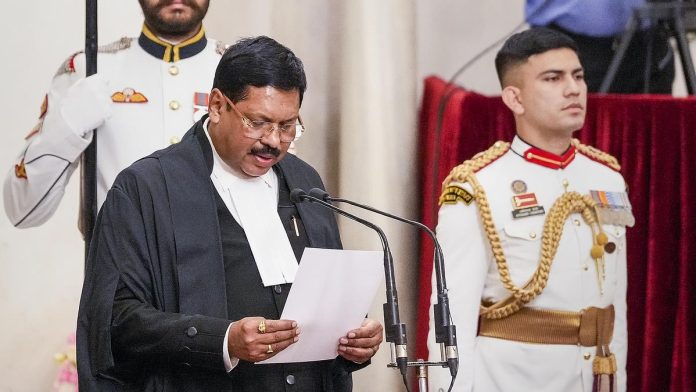New Delhi, May 14 – Justice Bhushan Ramkrishna Gavai was sworn in as the 52nd Chief Justice of India (CJI) on Wednesday, becoming the first Buddhist and only the second Dalit—after K.G. Balakrishnan—to hold the country’s top judicial post. His six-month tenure will conclude on November 23, 2025.
Hailing from a modest background in Amravati district, Maharashtra, Justice Gavai is the son of R.S. Gavai, founder of the Republican Party of India (Gavai). He paid tribute to his mother by touching her feet after taking the oath at Rashtrapati Bhavan.
Since his elevation to the Supreme Court on May 24, 2019, Justice Gavai has been part of several constitution benches, authoring around 300 judgments. His rulings have touched on crucial constitutional issues, fundamental rights, and reined in the executive’s use of “bulldozer justice.”
Justice Gavai played a role in major verdicts, including:
Abrogation of Article 370: He was part of the five-judge bench that unanimously upheld the Centre’s move to revoke Jammu and Kashmir’s special status.
Electoral Bonds: He participated in the bench that struck down the electoral bonds scheme for political funding.
Demonetisation: He was among the majority in the five-judge bench that upheld the 2016 demonetisation of ₹1,000 and ₹500 notes.
Caste-based Reservations: He joined a seven-judge bench that allowed states to create sub-categories within Scheduled Castes for reservation purposes.
Arbitration Law: A seven-judge bench, including Justice Gavai, ruled that arbitration clauses in unstamped contracts are still enforceable.
Free Speech: He was part of a bench that ruled public figures cannot face additional restrictions on their right to free speech beyond what the Constitution already allows.
Demolition Guidelines: He issued a significant judgment setting national norms for demolitions, mandating prior notice and a 15-day response window to affected parties.
Justice Gavai has also been active in environmental jurisprudence, passing orders for the protection of forests, wildlife, and trees.
Before joining the Supreme Court, he served as a permanent judge in the Bombay High Court from 2005, having first been appointed as an additional judge in 2003. He began his legal career in 1985 and held various public legal positions, including government pleader and public prosecutor for the Nagpur Bench of the Bombay High Court.
Justice Gavai is known for his firm belief in constitutional supremacy and has stated he will not accept any post-retirement positions. He has also lectured at prestigious institutions such as Columbia and Harvard on constitutional and environmental law.
His appointment was recommended by outgoing CJI Sanjiv Khanna and formally announced by the law ministry on April 29.




